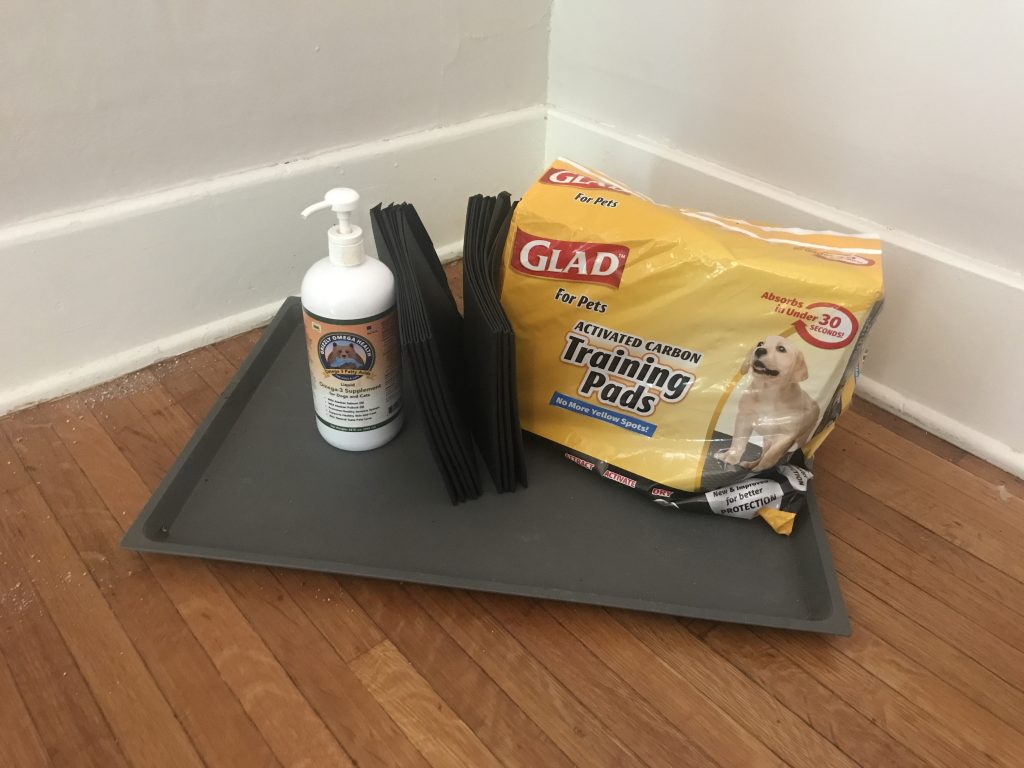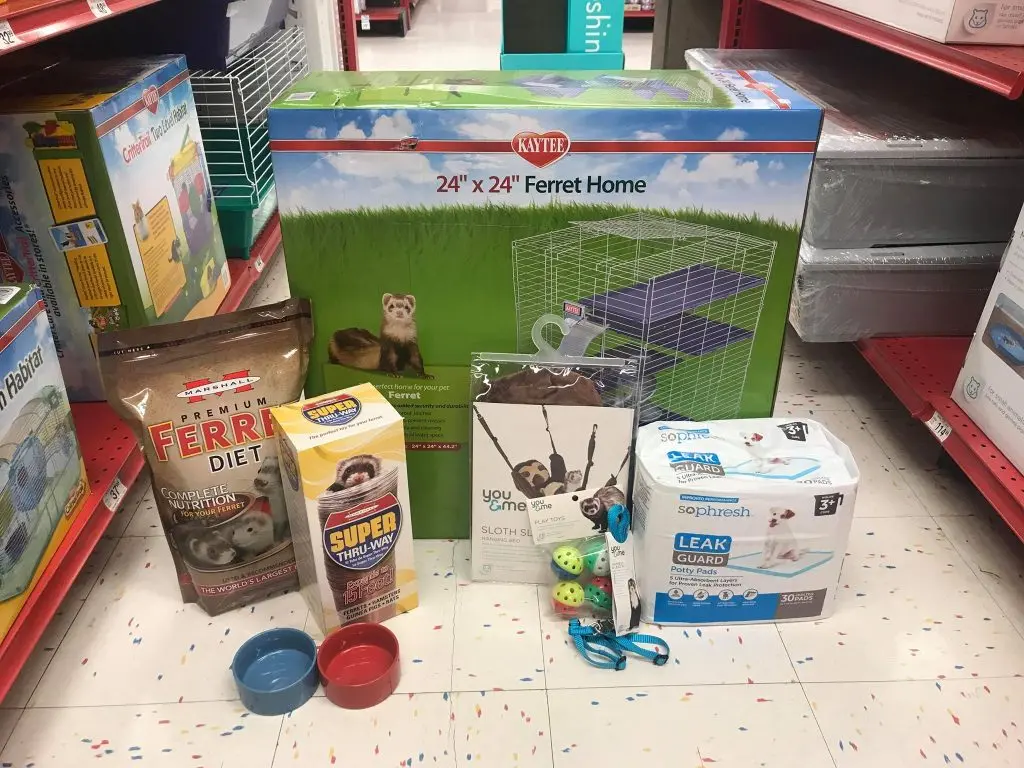Starting early when it comes to ferret potty training can make all the difference. Here is a step-by-step process (with tips and tricks) to get your ferret potty trained as soon as possible!
Let’s get potty training!
In this article, we will cover topics such as:
- What Supplies You Need to Potty Train Your Ferret
- Common Ferret Potty Behavior
- How to Know Your Ferret is About to Go Potty
- How Many Litter Boxes Do You Need?
- Establish a Good Potty Training Routine
- How Often Should You Clean the Litter Box?
- Why Your Ferret Keeps Missing the Litter Box
Ready to get started? Let’s go!
Supplies Needed to Potty Train Your Ferret

Let’s begin with a quick overview of some basic supplies you will need to get your ferret properly litter trained:
- A large, low litter box
- Safe litter or potty pads
- A healthy treat
A good litter box is big enough to fit your ferret’s entire body inside it. It also has low lips so your ferret doesn’t have a hard time getting into it as they back up. You’ll want to place your litter box in the corner of your ferret’s cage. You will need several litter boxes if your ferret has access to multiple rooms in your house (which we definitely recommend).
A bad litter box only fits your ferret’s butt inside it, had high lip edges, and contains wire flooring. For whatever reason, major pet stores still market these kinds of litter boxes as good for ferrets -save your money and opt for something like this. We’ve even used a boot tray in the past.
Next, you will need a good, safe litter. Believe it or not, some cat litters can actually be very harmful to your ferret (scented ones, wood shavings, dusty litter, clay, or ones that contain silica). The American Ferret Association has a great list on what litters are safe vs. dangerous for ferrets. We go into more detail on this topic here.
Some safe ferret litters include: Yesterday’s News, Pine Pellets, and potty pads.
Lastly, find a healthy treat your ferret enjoys to have on hand when your ferret uses the litter box. We like to use salmon oil, as long as it’s in moderation.
Bonus: if you are interested in exploring clicker training, we recommended keeping one on hand to use after your ferret uses their litter box correctly, right before you give them a treat. It helps reinforce this good potty behavior.
Common Ferret Potty Behavior
The first thing you need to understand is some basic physiology about your ferret. Ferrets are obligate carnivores, meaning their natural diet subsists of almost exclusively prey animals. Like other carnivores (or meat eaters) your ferret has a very short digestive system that allows him or her to process food very quickly.
According to The American Ferret Association, ferrets eat and poop every 3-4 hours (or at least this seems to be the case with kibble-fed ferrets). If you are in the process of litter training your ferret, you are going to need to try to be near your ferret each time they poop so you can observe their behavior and be there to reward them when they do it right! Repetition and consistency will help reduce potty accidents.
How Do I Know My Ferret is About to Go Potty?
So, how do you know a ferret is about to go to the bathroom? They will usually stop whatever they are doing (or bolt up out of a deep sleep) and make a b-line for some important place around the house, and they will begin to back up with their tail up. This means they are already going to the bathroom or seconds away from it. If your ferret just woke up, they will usually poop within the first 15 minutes.
How Many Litter Boxes Do I Need?

We like to place one litter box in every room our ferrets have access to, as well as one in their cage.
Ideally, you have a litter box close enough to where they are that they can make it in time. If your ferret keeps stopping short of the litter box and having accidents (for example they sleep and play in the living room and you only have a litter box in the kitchen), this may be an indication you need another, closer litter box.
Establish a Good Ferret Potty Training Routine
We have found it’s easier to start litter training when your ferret has access to a smaller area at first. When they master that area and consistently go to the bathroom only in their litter box, we then give them access to a second room with a second litter box and teach them how to use that one (as well as the old one).
The easiest time to reinforce good potty behavior, in our experience, is right when you wake up in the morning and you go to say hello to your ferret. Whether they are in a cage or in a ferret room, feel free to interact with them but wait to take them out until they do their business. Be on stand-by with your clicker and treat.
As soon as they go, (optional -click your clicker), tell them good job, and give them a treat.
Ideally, you should do this every time your ferret goes to the bathroom throughout the day, but this first morning potty is usually the easiest to catch.
How Often Should I Clean My Ferret’s Litter Box?
If you want your ferret to keep up this good behavior, make sure to clean their litter box frequently. Like I mentioned before, ferrets poop A LOT, and they really hate stepping in old poop. So much so that if the litter box is too dirty, they will start looking for other places to go to the bathroom. To avoid this, clean your ferret’s litter box at least once per day. If you are using litter, this means scooping poop and pee out once per day. On the other hand, if you use potty pads (like we do) this means throwing out dirty pads every day. If you use litter pellets, we recommend emptying the entire litter box out and scrubbing it with soap and water at least every two weeks.
We use potty pads. Sometimes, in between switching them out, we place toilet paper over a poop or pee spot to prevent our ferrets from stepping in it.
Why Your Ferret Keeps Missing the Litter Box
If your ferret has an accident, don’t yell, hit, or rub your ferret’s nose in their potty. This will only confuse and frighten your ferret. Instead, clean up the accident as best you can (to remove the marking smell) and try to determine why it happened.
There’s two different scenarios that could point to two possible causes:
Scenario one: your ferret pooped NEXT to their litter box. This could indicate that your ferret’s litter box is too small, too hard to get into, or possibly too full of poop and pee. Your ferret wants to poop in the litter box and knows where they should, but they are having trouble.
The solution? Get a bigger litter box and make sure to clean it more often. Also, double down on clicker and treat training to retrain your ferret what counts as a good potty.
Scenario two: your ferret chooses a completely NEW corner to poop in. This could indicate that your ferret’s current litter box is too far away and they need another closer one.
The solution? If you can, place another litter box where your ferret has started to poop, closer to where your ferret plays and sleeps. We try to have one litter box per room in our house.
How to Block Off a Bad Potty Spot Location
Sometimes ferrets choose their own potty locations before you can put down a litter box. If it’s an absolutely terrible spot to put a new litter box (like blocking your front door), you can try to put items there to deter your ferret from pooping there -like clothes, sleeping blankets, or their food or water. Ferrets don’t typically like to poop where they sleep or eat.
If that doesn’t work, we have also blocked off certain rooms in our home entirely so that our ferrets don’t have access (like our kitchen and bedroom). This keeps accidents to a minimum.
And as always, make sure to clean all your litter boxes as frequently as possible. This is probably our #1 tip on preventing your ferret from pooping in the wrong place. Ferrets HATE dirty litter boxes!
Stick With It!
Litter training takes time, for any animal, including ferrets. Potty training a puppy can take up to 6 months. Even some cats don’t get it at first. And just like dogs and cats, your ferret wasn’t born understanding what a litter box is, and why they are supposed to go there and only there, as opposed to every corner in the house.
However, over the years I’ve learned that ferrets are incredibly intelligent creatures, so you just need to take the time to properly communicate to them what you want and they will be happy to listen -especially for a treat!
Make sure to check out our in-depth review on ferret litter to help figure out which one’s best for you.
Good luck and please share any of your own tips in the comment section below to help your fellow ferret owners.




